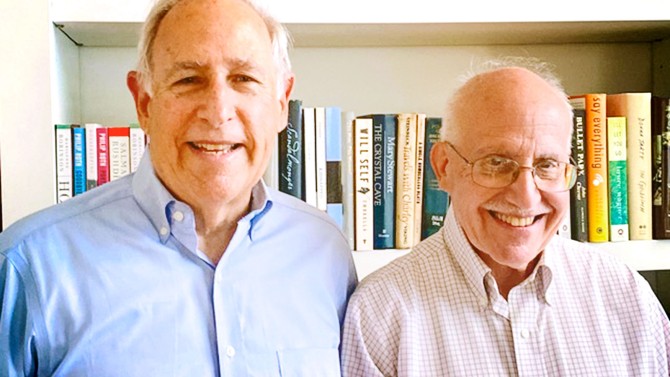Co-authors Stuart Blumin, professor emeritus of American history, left; and Glenn Altschuler, Ph.D. '76, the Thomas and Dorothy Litwin Professor of American Studies.
"The Rise and Fall of Protestant Brooklyn," a new book by Cornell authors, traces how an influx of New Englanders made an indelible mark on the borough - and how the arrival of Catholic and Jewish immigrants from Italy, Germany and elsewhere challenged that hegemony to form the vibrant, diverse community we know today.
The book is the latest collaboration by Glenn Altschuler, Ph.D. '76, the Thomas and Dorothy Litwin Professor of American Studies in the College of Arts and Sciences, and Stuart Blumin, a professor emeritus of American history (A&S) and former director of Cornell in Washington.
The two previously co-wrote "The GI Bill: The New Deal for Veterans" and "Rude Republic: Americans and Their Politics in the 19th Century."
Altschuler and Blumin spoke with Cornellians about the recent book.
Question: What's your personal relationship to Brooklyn?
Altschuler: I was born in Brownsville, and before I came to Cornell as a graduate student in 1971, my family lived in different neighborhoods, including Flatbush and Sheepshead Bay. My father worked in a shoe store in Downtown Brooklyn - named, believe it or not, Cornell Shoes.
I was an undergraduate at Brooklyn College, and I worked at a clothing store in an Italian neighborhood when I was in high school and college.
But the irony is that Stuart, who is an urban historian and is from Miami, knows Brooklyn much better than I do.
Blumin: I live on the Upper West Side of Manhattan, but Brooklyn is a special place for me. As Glenn said, I was born in Miami - the "sixth borough."
After World War II, a lot of people moved there from Brooklyn. Many of the boys in my second-grade class were from Brooklyn.
And this was the precise moment when the Brooklyn Dodgers became a serious threat to win the National League pennant. So to save my life, I became a very avid Dodgers fan.







